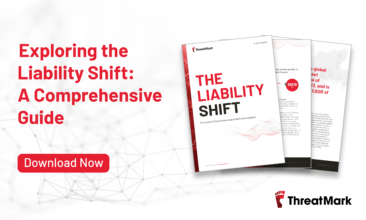Insights
Explore the latest company news, market insights, and the latest on digital fraud with our Insights.
Whitepaper
EXPLORING THE LIABILITY SHIFT: A COMPREHENSIVE GUIDE
Shifting liability for fraud losses represents a significant challenge for banks and payment service providers. Explore our whitepaper for an in-depth analysis of the implications of this shift, and strategies for effective fraud prevention.
Download Now
Filter Close
-
 July 23, 2024
South Africa’s Growing Challenge with Online Fraud
South Africa is facing an unprecedented proliferation in fraud incidents.
Currently ranking among the top in cybercrime density, fraudsters continue...
July 23, 2024
South Africa’s Growing Challenge with Online Fraud
South Africa is facing an unprecedented proliferation in fraud incidents.
Currently ranking among the top in cybercrime density, fraudsters continue...
-
 July 17, 2024
APP Scams and Liability: Essential Insights for the Rest of 2024
As we hurdle through 2024, data continues to indicate a global rise in fraud incidents, with scams becoming particularly...
July 17, 2024
APP Scams and Liability: Essential Insights for the Rest of 2024
As we hurdle through 2024, data continues to indicate a global rise in fraud incidents, with scams becoming particularly...
-
 July 11, 2024
Behavioral Biometrics: Key to Scam-Safe Accord Compliance for Australian Banks
By the end of 2024, all new online account openings in Australia will require at least one biometric check,...
July 11, 2024
Behavioral Biometrics: Key to Scam-Safe Accord Compliance for Australian Banks
By the end of 2024, all new online account openings in Australia will require at least one biometric check,...
-
 June 28, 2024
How the Nordics Are Tackling Phishing in a Cashless World
The Nordic region – including Sweden, Denmark, Norway, Finland, and Iceland – is known for embracing the future. From...
June 28, 2024
How the Nordics Are Tackling Phishing in a Cashless World
The Nordic region – including Sweden, Denmark, Norway, Finland, and Iceland – is known for embracing the future. From...
-
 June 21, 2024
Tackling APP Fraud in the US: Behavioral Intelligence as a Tool
Authorized push payment (APP) fraud is among the most common types of financial deception encountered in the US today.
In...
June 21, 2024
Tackling APP Fraud in the US: Behavioral Intelligence as a Tool
Authorized push payment (APP) fraud is among the most common types of financial deception encountered in the US today.
In...
-
 June 14, 2024
Overcoming Latin America’s Digital Fraud Challenges
Latin America is among the regions most troubled by payment fraud worldwide.
This success of fraudsters stems from multiple factors:...
June 14, 2024
Overcoming Latin America’s Digital Fraud Challenges
Latin America is among the regions most troubled by payment fraud worldwide.
This success of fraudsters stems from multiple factors:...
-
 June 13, 2024
Exploring the Liability Shift: A Comprehensive Guide
Shifting liability for fraud losses represents a significant challenge for banks and payment service providers.
In response to the...
June 13, 2024
Exploring the Liability Shift: A Comprehensive Guide
Shifting liability for fraud losses represents a significant challenge for banks and payment service providers.
In response to the...
-
 May 31, 2024
AI-Driven Fraud Explained
With AI becoming intertwined in nearly every aspect of our lives, its exploitation by fraudsters has become a concerning...
May 31, 2024
AI-Driven Fraud Explained
With AI becoming intertwined in nearly every aspect of our lives, its exploitation by fraudsters has become a concerning...
-
 May 15, 2024
Exploring the Challenges of Real-Time Payments in the US
In the swiftly evolving world of finance, real-time payments are reshaping money movement globally. With the mid-2023 launch of...
May 15, 2024
Exploring the Challenges of Real-Time Payments in the US
In the swiftly evolving world of finance, real-time payments are reshaping money movement globally. With the mid-2023 launch of...
-
 May 8, 2024
How Behavioral Intelligence is Helping Combat Investment Scams
Investment scams rank as the most widespread form of APP fraud worldwide, causing significant financial loss and affecting more...
May 8, 2024
How Behavioral Intelligence is Helping Combat Investment Scams
Investment scams rank as the most widespread form of APP fraud worldwide, causing significant financial loss and affecting more...
-
 April 18, 2024
Who Carries the Cost of Fraud? The Changing Landscape of Fraud Liability
As the payment services industry evolves, it faces critical challenges.
One of the most imminent is the continuous fight against...
April 18, 2024
Who Carries the Cost of Fraud? The Changing Landscape of Fraud Liability
As the payment services industry evolves, it faces critical challenges.
One of the most imminent is the continuous fight against...
-
 April 10, 2024
Tackling the Rising Threat of Digital Fraud in Sweden
Sweden and other Nordic nations are facing a daunting challenge of digital fraud.
Fraudsters are employing advanced social engineering tactics...
April 10, 2024
Tackling the Rising Threat of Digital Fraud in Sweden
Sweden and other Nordic nations are facing a daunting challenge of digital fraud.
Fraudsters are employing advanced social engineering tactics...
